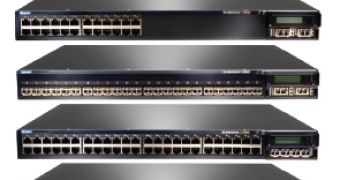Juniper is not too much of a name in home and small office networking market, but enterprise level system administrators hiding inside server closets have many times seen the company as a reliable partner. The enterprise networking sector is currently dominated by Cisco Systems, and all that it takes for Juniper to catch up with its archrival is a switch portfolio.
Things are about to change with the advent of the company's first enterprise-class switching portfolio, called the Ex series. It is comprised of three key products, namely the EX 3200, EX 4200 and EX 8200. The models are different in functionality and prices, and provide new features, such as virtual expansion.
"We've heard the questions of why aren't you in switching or who are you going to buy?, " said Hitesh Seth, an executive vice president at Juniper. "We've been listening and the results are on this podium. We made a conscious decision to build versus buy."
The EX 3200 model comes in a fixed configuration and offers 24- and 48-ports for 10/100/1000BASE-T connectivity. This is quite standard, since other manufacturers of enterprise networking gear already offer Gigabit Ethernet as mainstream, while high-end switches and routers come with speeds of 10 Gbps.
The next model in the line is the EX 4200 that is wrapped around Juniper's "Virtual Chassis" technology. The device can be expanded beyond its default configuration up to 480 10/100/1000BASE-T ports. The switch is designed for medium businesses only.
The top product in the EX line is the 8200 model, that comes available either in an eight-slot, 1.6 terabit configuration, or in a 16-slot, 3.2 terabit chassis. This is the only model in the series to feature the above-mentioned support for 10 Gb Ethernet routing. Moreover, according to Juniper, the device will be able to operate on the upcoming 100Gb Ethernet standard, once it gets finalized.
All the switching gear from Juniper is powered by the company's proprietary operating system, called the JUNOS. "We're delivering simplicity though JUNOS," Seth said. "For the first time, routing and switching infrastructure can run on the same OS. We will also have a common management system that will deliver operational benefits to enterprise customers."
Juniper announced its newest line of switches a few days after rival Cisco unveiled its high-end switch, commercially known as the Nexus 7000.

 14 DAY TRIAL //
14 DAY TRIAL //